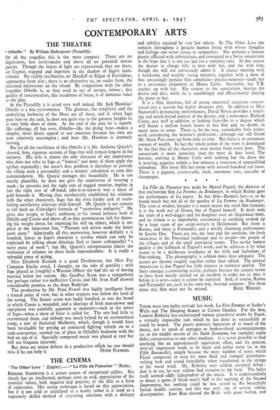THE CINEMA
The Other Love " (Empire).—" La Fille dPuisatier " (Rialto).
• BARBARA STANWYCK is a screen actress of exceptional calibre. She clearly has an intellectual, perhaps even an acid, appreciation of the essential values, both negative and positive, of the film as a form of expression. Her acting technique is based on this appreciation, but it is not cold or calculated as a result; rather is it used as a supremely skilful method of conveying emotions with .a delicacy and subtlety attained by very few others. In The Other Love she remains throughout a genuine human being with whose thoughts and feelings one never ceases to sympathise. She portrays a famous pianist afflicted with tuberculosis, and consigned to a Swiss sanatorium in the hope that it is not too late for a complete cure. In due course the doctor in charge falls in love with her, and she with him, though she will not consciously admit it. A chance meeting with a handsome and wealthy racing motorist, together with a dose of that unceasingly popular film complaint—psycho-neurosis—lands her in a passionate elopement to Monte Carlo. Inevitably, her T.B. catches up with her. She returns to the sanatorium, marries the doctor and dies, while he is stumblingly and affectionately playing the piano to her.
It is a film, therefore, full of strong emotional situations concen- trated into a narrow but highly dramatic plot. In addition to Miss Stanwyck's dominating performances, David Niven provides a touch- ing and nicely-keyed portrait of the doctor, and a newcomer, Richard Conte, acts well in addition to looking faun-like to a degree which will flutter a million female hearts in this film and, no doubt, in many more to come. There is, by the way, remarkably little piano- work considering the heroine's profession ; although our old friend Mr. Show Pan crops up from time to time. But there is an enormous amount of wealth. In fact the whole action of the story is dominated by the fact that all the characters ooze money from every pore. The sanatorium is more luxurious than the most de luxe hotel. The heroine, arriving at Monte Carlo with nothing but the dress she is wearing, acquires within a few minutes a trousseau of unparalleled splendour. Her lover fills her room with several hundred red roses. There is a gigantic steam-yacht, sleek, enormous cars, cascades of champagne.
* *
La Fille du Puisatier was made by Marcel Pagnol, the director of that enchanting film La Femme diu Boulanger, in which Raimu gave the performance of his career.' In this film—Raimu's last—is to be found much but not all of the quality of La Femme du Boulanger. The story is weaker, because it is much nearer the stock film formula; it is the work not of Giono, but of Pagnol himself. It deals with the trials of a well-digger and his daughter over an illegitimate baby, and its climax is as improbably sentimental as anything cooked up by a large team of ace script-writers in Hollywood. But there is Raimu, and there is Femandel; and a wholly charming performance by Josette Day. There are too, the heat and the sunshine, the fresh sweatiness of the Provencal landscape and its people—the people of the villages and of the small provincial towns. This earthy human quality is the hallmark of Pagnol's work, and he achieves it by what seems to be a deliberate avoidance of the frills and furbelows of film-making. The photography is seldom more than adequate. The scenes are thrown roughly together rather than edited. The general impression is that Pagnol has little interest in technical quality. Yet there emerges a convincing reality, perhaps because the camera seems to have been hastily trained on an incident in order not to miss it before it is over—since it cannot be repeated: And, of course, Raimu and Fernandel are, each in his own way, beyond compare. For them alone this film must not be missed. BASIL WRIGHT.


































 Previous page
Previous page